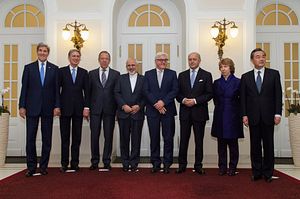Chinese Foreign Minister Wang Yi is in Vienna for the P5+1 talks with Iran that aim to solve a long-standing impasse over Iran’s nuclear program. With the outcomes of the talks in doubt, Beijing is showing its support for continued discussions – and continued outreach to Tehran.
Wang met with his Iranian counterpart, Foreign Minister Mohammad Javad Zarif, on the sidelines of the talks. In that meeting, Wang made it clear that China sees itself as a neutral arbitrator in the talks (unlike the U.S.). China, “as a responsible negotiating party,” seeks “a comprehensive agreement over the matter, which meets the common interests of the international community, including Iran,” Xinhua paraphrased Wang as saying. With the West and Iran at an impasse over the extent of permissible nuclear development in Iran, China’s positioning could help shift the tenor of talks.
For starters, Wang noted that China supports an extension of negotiations. Monday’s deadline came and went without a breakthrough; according to Reuters, diplomatic sources expect negotiations to resume next month. Negotiators could also push for a formal extension of the existing interim agreement, which allows for limited sanctions relief while Iran takes concrete steps to limit its nuclear program. In Monday’s press conference Foreign Ministry spokesperson Hua Chunying told reporters, “The Chinese side … is exploring better ways to advance the negotiation in light of the current situation.”
Hua added that China “has been playing a constructive role in its own way in the course of negotiations.” With her insistence on China being constructive “in its own way” (negotiating with “Chinese characteristics”), Hua tacitly acknowledged that China is not quite playing the role that the Western powers, particularly the U.S. would like to see. The Obama administration made getting Chinese cooperation on the Iran nuclear issue a major focus on its early diplomacy with China, always hoping that a tougher Chinese stance would force Tehran to accede to Western restrictions on nuclear development.
The Obama administration won some limited cooperation from China on this front, despite Beijing’s traditional abhorrence of sanctions. However, ever since the P5+1-Iran talks heated up with an interim agreement last November, China has been moving closer to Tehran, seizing the chance to develop a sound relationship with a Middle Eastern power player while international conditions allow. Chinese oil imports from Iran surged to 630,000 barrels per day in the first six months of 2014, up 48 percent from the same period in 2013 (thanks in part to reduced Western sanctions as part of the interim agreement). Meanwhile, total trade between the China and Iran was worth nearly $40 billion in 2013, according to China’s foreign ministry. China exports electronics, textiles, steel, and industrial chemical products to Iran and mainly imports crude oil, ores, and other raw materials.
Increased economic ties have been accompanied by a surge of interactions in the political and military arenas. China and Iran are seeking greater cooperation on counter-terrorism as well as more conventional military cooperation. In September, the two countries held their first-ever joint naval exercise in the Persian Gulf. Iran followed that up by sending its naval chief to Beijing in October, where both countries promised more military cooperation in the future. On the diplomatic front, Iranian Foreign Minister Zarif traveled to Beijing for the Istanbul Process meeting at the end of October. Zarif met with Chinese State Councilor Yang Jiechi and the two promised to deepen China-Iran cooperation. Chinese President Xi Jinping has also met several times with Iranian President Hassan Rouhani, most recently in Shanghai on the sidelines of the Conference on Interaction and Confidence Building Measures in Asia.
Increased cooperation points to the growing importance Iran has for China’s national interests. Beijing has always had a vested interest in Iran as an energy source. However, in the past few years, Iran has increased in strategic importance for Beijing. Good relations with Iran, both economically and politically, will be helpful to Chinese interests as it “marches west” with its Silk Road initiatives. Meanwhile, Iran is also seeking alternative partners as it continues to struggle with engaging the West. New organizations backed by China, from the Shanghai Cooperation Organization to the Asian Infrastructure Development Bank, provide room for Iran in international forums, something Tehran largely lacks in U.S.-backed organizations.
What does all this have to do with the P5+1 talks? As Iran grows closer to China, including increased engagement with Chinese-led international and multilateral organizations, there’s less incentive for Iran to make sacrifices in order to secure more normal relations with the West. Even economic sanctions will have less bite as China continues to deepen its own economic engagement with Tehran, particularly considering the hefty investments that are likely to follow China’s Silk Road Economic Belt into Iran. China has made it quite clear that it is looking out for Iran’s interests, not only the West’s, at the talks in Vienna; that means the West will need to take Iran’s concerns seriously as well in order to actually reach a deal.

































